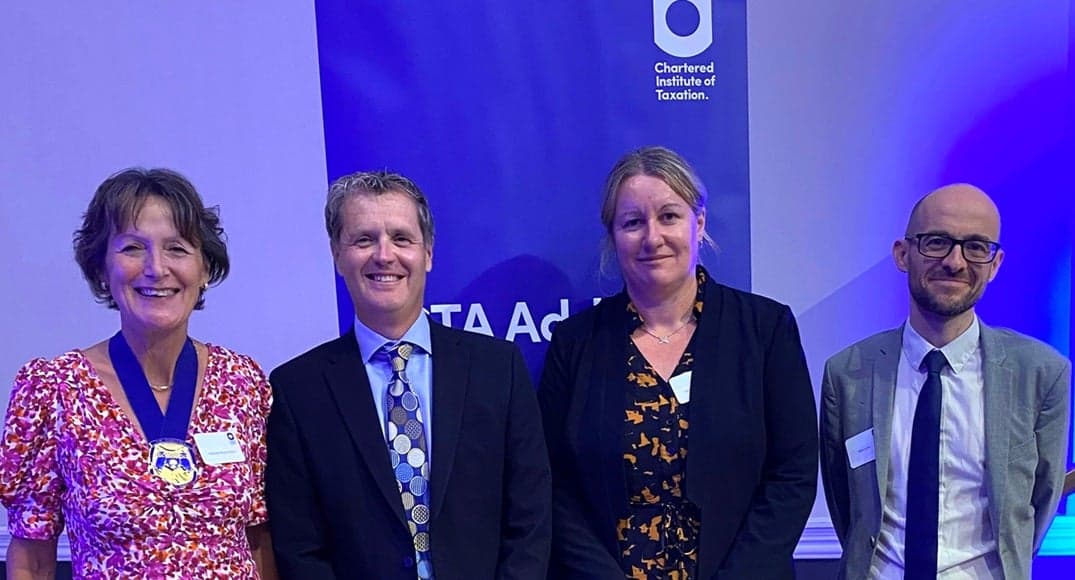CTA Address: Laser focus and greater cooperation needed to tackle today’s tax crime
Tackling tax crime is a tough job, and ministers and HMRC will need a “laser focus” if they are to clamp down on non-compliance. Simon York, until 2023 Director of HMRC’s Fraud Investigation Service, was giving the 2025 Chartered Tax Advisers Address, where he argued that greater collaboration across government and the private sector, more effective use of data and intelligence and a more aggressive focus on the enablers of tax evasion would maintain fairness and trust in the UK’s tax system.

Above: CTA Address panel Nichola Ross Martin (chair), Simon York, Michelle Sloane, Mike Lewis
* Watch a recording of the CTA Address and debate here *
The address
Panama Papers
York began by recounting the 2016 Panama Papers leak, which had shone a spotlight “on the sort of activity I had spent a life investigating, albeit…out of the public gaze.”
Dishonesty, secrecy and the hiding of transactions, wealth and assets had been “the hallmark of tax crime for centuries” from the Domesday juries to numbered Swiss bank accounts. Because of this, York said: “the fact that lots of people were evading tax shouldn’t have come as a surprise.”
He said that HMRC knew the substance, if not the scale, of the Panama leak, saying that the scandal had “paved the way” for action across government to tackle economic crime.
Tax crime in the 21st century
Tax crime comes in different forms, from the wealthiest shielding money in complex offshore structures, to the small business owner skimming their receipts or criminals engaging in money laundering and illicit trade.
York said tax crime was increasingly international in its focus, “significantly more so than 20 or 30 years ago”, with advances in technology making it easier for criminals to strike and more challenging for taxpayers and the authorities to hold their guard. With HMRC having prevented the loss of nearly £2 billion from criminal attacks in the last year alone, these were “pretty sobering figures which really highlight the scale of the challenge”, according to York.
Around a third of the UK’s £48 billion tax gap is attributable to evasion or criminal activity, money York said could fund public services, protect taxpayers and maintain public confidence in the tax system if recouped. It was a “huge headache for governments and tax administrations” but if tackled, it would send a clear message of deterrence, showing that “bad tax behaviour can mean life changing consequences”.
What are the solutions?
HMRC has much of the raw data needed to tackle tax crime and while criminal investigations will remain an important tool in the fight, relying on them will only “recover a percentage, often a relatively small percentage, of the fraud that has taken place.” The focus, he said, should be on stopping it happening in the first place.
York called for “clear strategic intent”, at scale, for “maximum impact”. He said this could include:
- Better use of data and intelligence.
- A more aggressive focus on “the key facilitators, the corrupt professional advisors and the dirty money guys.”
- Closer working with the private sector to share financial information, because “Government can’t do it all itself and we need a new culture.”
- “More direct and timely” international cooperation between tax administrations and law enforcement, such as the J5 group of nations (Australia, Canada, the Netherlands, Britain and the United States).
- HMRC having the right resources and skills, whether internally or “buying in the skills they need.”
The responses
Responding to the address were Michelle Sloane, Partner at the international law firm RPC, and Mike Lewis, the Director of the investigative think tank TaxWatch.
Sloane said York’s remarks were a good reminder of the steps the UK has already taken to tackle tax fraud and where it needs to go next. She said the UK tax gap remained “really significant” and agreed with the need for a more strategic approach.
She believed HMRC could do more with the tools it has at its disposal, including with the Corporate Criminal Offence (no prosecutions since its introduction) and Code of Practice 9, HMRC’s highest level of non-criminal investigation, which she described as having been “rarely used”. HMRC’s new whistleblower regime, an initiative that will mirror schemes already in place in North America, could be a “game-changer” if properly resourced. And small businesses, who account for 60% of the tax gap, should be the subject of tougher enforcement action.
Lewis lamented the UK’s “historically low” levels of criminal prosecutions and convictions and backed the need for better information sharing. And, while he agreed with Sloane on the need to target small business evasion, he wanted to see continued action against the very wealthiest, believing that “in terms of fairness, we have to chase both.”
Q&A
In the Q&A that followed, York told the audience that the tax profession had been “a huge force for good” in the fight against tax evasion, urging advisers to be mindful of the “wider ecosystem” in which they operate. He said it was “probably impossible” to prevent innocent taxpayers from being caught unintentionally by the process, but that harm could be minimised by proper risk assessments. He said bad actors needed to know that their actions would have consequences. And that reforms to Companies House would “100%, yes” help in the fight against tax crime.
Lewis described Companies House as a “complete mess” and a threat to security. Sloan said she wanted to see HMRC send a strong message of deterrence, with high-profile media campaigns targeted on issues or sectors of concern. Unless there was a clear deterrent, she said small businesses in particular would keep getting away with bad actions.
